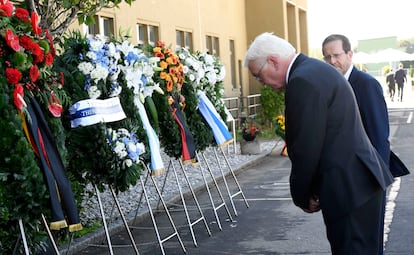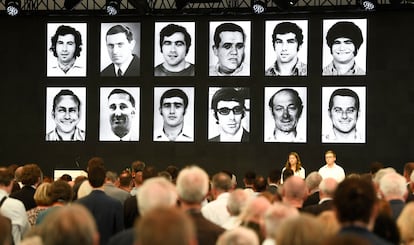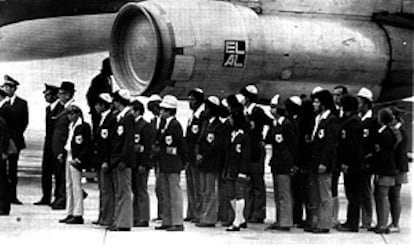Germany apologizes 50 years after the Munich Olympics massacre
President Frank-Walter Steinmeier said he felt “shame” for having taken decades to recognize failures mistakes and to agree on compensation for the families, who will receive €28 million

Fifty years later, there are still many unanswered questions about the 1972 Munich Olympics massacre. There is also much pain among the relatives of the victims, who continue to wonder how so many errors could have occurred in the attempt to rescue the 11 Olympic athletes that a Palestinian terrorist group named Black September took hostage and ended up killing.
One chapter is now closed after Germany acknowledged its responsibilities as the host of those “Cheerful Games” that ended in the worst tragedy in Olympic history. For the first time, German authorities have apologized and recognized their failures.
“I am ashamed,” German President Frank-Walter Steinmeier said in front of a grieving Israeli President Isaac Herzog during the commemoration event in Munich. “As head of state of this country and on behalf of the Federal Republic of Germany, I ask your forgiveness for failing to protect Israeli athletes and for the subsequent failure to seek explanations,” he added, addressing relatives present at the event.
Some 70 family members finally showed up at Fürstenfeldbruck air base, on the outskirts of Munich and the scene of the bloodbath that resulted from a disastrous police operation to try to rescue the hostages. “I am glad that the authorities have finally recognized their responsibility and openly talked about the mistakes. It has been a great relief,” Shlomit Romano, daughter of weightlifter Yossef Romano, told public television.

After extensive discussions – and under the threat of a boycott by relatives of the victims – an agreement was reached last week. Berlin will pay €28 million (around €1.2 million for each of the 23 families entitled to compensation) for its responsibility in the attack. For the first time, the German state has acknowledged that serious mistakes were made that led to the death of the 11 Israeli athletes.
The German president, Frank-Walter Steinmeier, assured that Germany has taken too long to recognize its responsibility and to act accordingly. It is “shameful,” he admitted, that five decades had to pass to reach a compensation agreement with the families. “For too long, we have not wanted to recognize that we also have a share of responsibility. Our task was to ensure the safety of Israeli athletes,” he added.
Herzog lamented that for years “it seemed like one simple truth had been forgotten: this was not a uniquely Jewish and Israeli tragedy – this was a global tragedy! A tragedy that must be recalled and commemorated at every Olympic Games; a tragedy whose lessons must be taught, from generation to generation.”
“It desecrated the unifying and cohesive sanctity of the Olympics, the ultimate symbol of sports, and smeared its flag with blood. The Olympic flag, with its five rings, would never again be what it was before,” said Herzog, who on Tuesday was scheduled to visit the Bergen-Belsen concentration camp, liberated by his father Jaim in 1945 with the British army, which then administered Palestine.

Munich 72 was the great opportunity for Germany to present itself to the world as a modern, friendly and cosmopolitan country, and to erase from the collective imagination the memories of the last Olympic Games that Berlin had organized in the middle of the Nazi regime. The atmosphere was jovial and relaxed, so much so that the Bavarian police were dressed in plainclothes and unarmed. Munich was for 10 days a kind of festival of concord, which also experienced memorable athletic feats, such as the seven gold medals won by the American (and Jewish) swimmer Mark Spitz.
A few hours after that feat, tragedy struck. In the early hours of September 5, 1972, a commando from the Palestinian terrorist group Black September broke into an apartment occupied by the Israeli team in the Olympic village. Eight men who jumped over a fence in the compound, dressed in tracksuits and hiding their weapons in sports bags. They killed a coach and an athlete and took nine other team members hostage, demanding the release of 234 Palestinian prisoners, as well as the leaders of the far-left German terrorist group Red Army Faction (RAF), Andreas Baader and Ulrike Meinhof.
Beginner’s mistakes
The response by the Police of the Federal Republic – the reunification of the two Germanys would not take place until 1990 – consisted of a rescue operation plagued by incompetence and beginner’s errors in which the nine Israeli hostages, an agent and five of the eight kidnappers ended up dead. Israel offered to send a specialized unit, but the German government rejected it. The Army, which had trained snipers, did not participate in the operation because the German Constitution prohibited its intervention in peacetime.
The Bavarian Police were neither well equipped nor adequately trained to deal with a hostage situation. They made a disastrous attempt to break into the Olympic village apartment that had to be aborted because the kidnappers realized their intentions. The Munich attack was the first to be covered live by the media and the assailants could see the officers, dressed in brightly colored tracksuits, approaching their door on their TV screens.

The calamitous German police operation, which ended with a shootout at the airport, drew criticism around the world and strained diplomatic relations with Israel, where it caused a shock that still lingers half a century later. The following day, on September 6, a memorial was held for the victims in which the then president of the International Olympic Committee, Avery Brundage, said that the Games must go on and not yield to terror.
The relatives of the victims have been asking since then for an official apology from Germany, reasonable compensation and the declassification of documents about the tragedy. They achieved their first victory two decades ago, when as a gesture of goodwill – while making it clear that it was not an admission of responsibility – German authorities agreed to pay six million marks. The figure did not go unnoticed in Israel, coinciding with the number of Jews murdered by Nazi Germany and its allies during the Holocaust. The families then asked to be paid in dollars and received $90,000 each, while Israeli and German lawyers pocketed $2 million, as the Israeli daily Haaretz reported.
Commission of historians
The new agreement with the victims includes the release of documents and the creation of a commission of German and Israeli historians that will draft a report on the greatest tragedy in Olympic history.
During the negotiations, the German government had offered the victims €10 million, minus the €4.6 million it had already paid in 1972 and 2002. Some considered it “an insult” and a “terrible joke,” including Ankie Spitzer, widow of André Spitzer, the fencing coach of the Israeli team, who acts as spokesperson for the families.
Tu suscripción se está usando en otro dispositivo
¿Quieres añadir otro usuario a tu suscripción?
Si continúas leyendo en este dispositivo, no se podrá leer en el otro.
FlechaTu suscripción se está usando en otro dispositivo y solo puedes acceder a EL PAÍS desde un dispositivo a la vez.
Si quieres compartir tu cuenta, cambia tu suscripción a la modalidad Premium, así podrás añadir otro usuario. Cada uno accederá con su propia cuenta de email, lo que os permitirá personalizar vuestra experiencia en EL PAÍS.
¿Tienes una suscripción de empresa? Accede aquí para contratar más cuentas.
En el caso de no saber quién está usando tu cuenta, te recomendamos cambiar tu contraseña aquí.
Si decides continuar compartiendo tu cuenta, este mensaje se mostrará en tu dispositivo y en el de la otra persona que está usando tu cuenta de forma indefinida, afectando a tu experiencia de lectura. Puedes consultar aquí los términos y condiciones de la suscripción digital.








































